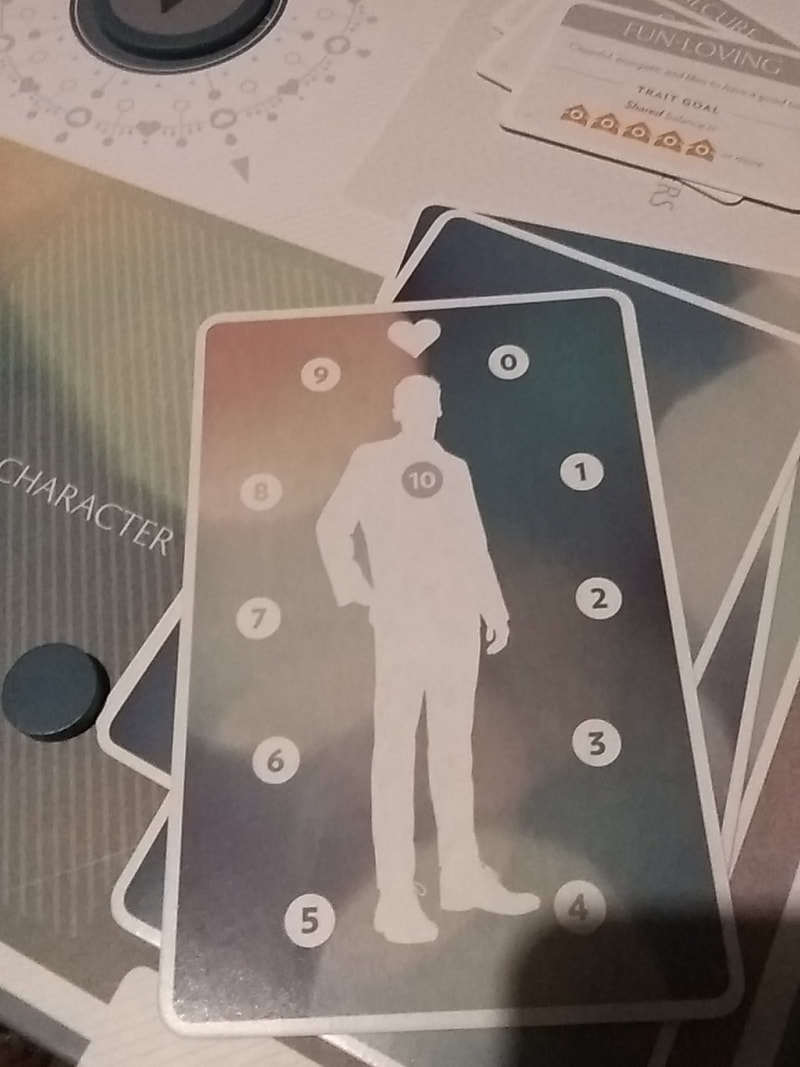|
20th February. Matt bought a copy of 2-player game Fog of Love round and we had a go. First impressions: High production values, looks nice, quality components. The game has a long set-up - particularly for a 2-player game. It has a specific tutorial set up for the first play. Fog of Love is a game about a relationship between 2 players, how it starts and how it possibly ends. The game is a strange mix of sort of 'area-control and the old TV show 'Mr & Mrs' and is a bit tricky to explain. So when you play this game, you're meant to narrate your actions in the game as a story. We did it a little bit, but not much. Before I talk about how the game is played, I think I need to explain what you need to do to win. To win, a player must have the highest happiness. There appear to be 4 ways to gain happiness.
Traits Your fictional relationship with the other player is defined through 6 'personality dimensions', these are such things a discipline, extrovert etc, each personality dimension has a plus and a negative. At the start of the game you will pick some traits, traits are hidden from the other player and represent most of your goals for the game. Achieving these goals helps you win the game. Usually the goal of a trait will be to acquire a certain score in a certain personality dimension by the end of the game. This could be something like have +4 in Extrovert or -3 in Sensitivity. The twist here is that the score is shared between both players. Thus if you put a point in the positive score of a personality dimension and the other player puts a point in the negative score, the total score for that personality dimension will be 0. Getting the scores you want in specific personality dimensions appears to be the key to victory. At the start of the game you pick a profession and 3 traits, after this you pick some features which you give to the other player. Features like tall, or slow talker etc. This defines the other players character., it will also change their scores in the the personality dimensions. Both players are then dealt a hand of 'scene' cards. These represent events that couples might have in their relationship., such as going on holiday, buying gifts. There's loads of them and they come in 3 different flavours. Sweet, serious and drama. Then play begins. Questions & Answers
Alternating between the players, each one plays a scene card. A scene card consists of a description of an event and up to 4 different responses that can be given. This is done by reading the card out to the other player. Cards basically come in 2 types, a question that the other player must answer or a question that both players must answer. For example: Question: Holiday in Rome (both players must answer). There might be 4 answers. A: Yes for a month. B: Yes for a fortnight C: Yes for week. D: No. Each answer will give you points in a personality dimension. Different types of answer will give you points in different areas. So saying 'No' might increase your score in 'Discipline', saying 'Yes' might increase your score in 'Extroversion'. If it's a question both players must answer, then they must do so in secret (using some nice chunky poker chips marked A-D). Then answered are compared. Generally, if the players answers match, they tend to get some bonus for it. When answering these questions, you will know what you get if you have to provide an answer as well. But when the question is posed by the other player, you have to try and guess which answer will give you points in the personality dimension that you want to increase (as dictated by your traits). Play proceeds like this until you have completed all 3 'chapters' of the game. Each chapter has a number of scene cards you need to play. Secrets You can also get 'Secret' cards that are hidden until revealed, either during normal play or as part of the endgame. It will give different rewards, dependant on when it is revealed. Destiny Finally you have 'Destiny' cards. Both players keep at least 2 hidden destiny cards (but not part of their hand) that they must choose one to play during the endgame. If the criteria on the destiny card is met, then extra points are scored. So finally, all relevant points are applied to happiness and the player with the highest happiness, wins! Fog of Love is an interesting idea and ok to play. But I'm not sure on it's depth or longevity. There doesn't appear to be any strategy other than trying to use questions (or answer questions) that match your traits as closely as possible. The destiny cards seem very hard to complete and thus irrelevant. You appear to start the game with the same 4 cards every time, I don't know if you can pick up more during play. There are apparently other chapters you can play that alter the types of scene cards you can play in different chapters. But I don't know if this add enough to the game. This game requires at least another play before I settle on a opinion on it.
0 Comments
Leave a Reply. |
AuthorI play, I paint. Archives
March 2024
Categories
All
|


 RSS Feed
RSS Feed
